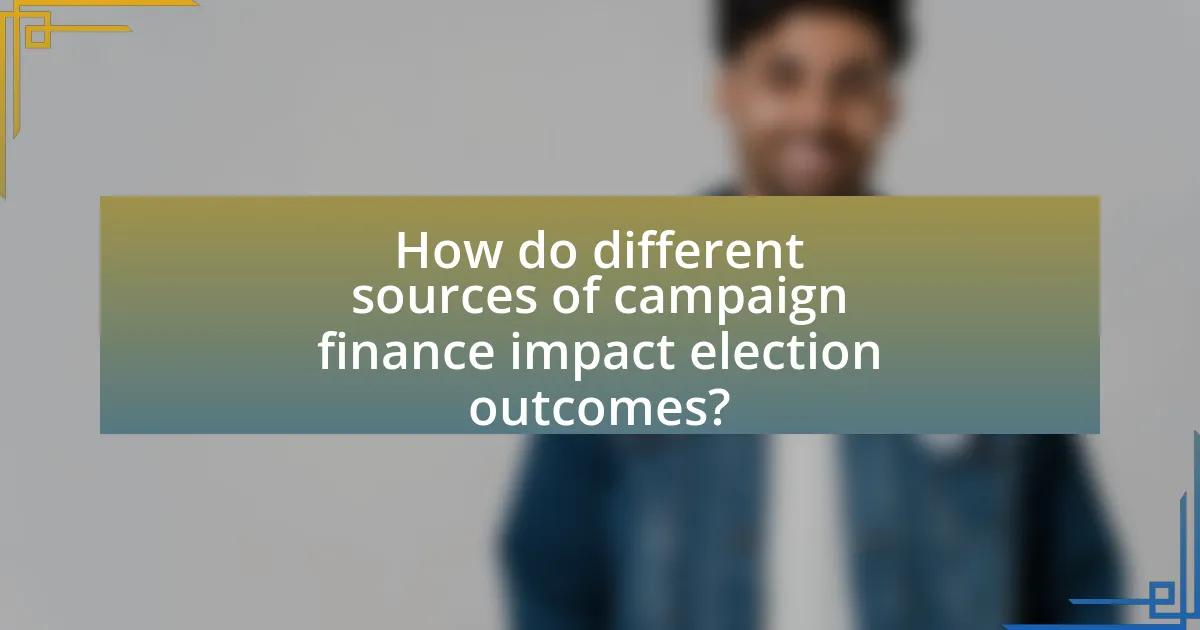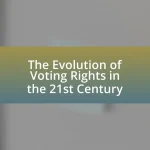The article analyzes the critical role of campaign finance in shaping election outcomes, emphasizing how financial contributions influence candidates’ visibility, voter behavior, and overall electoral success. It discusses the impact of campaign finance on public perception, psychological factors, and the legal frameworks governing contributions and spending. Additionally, the article explores the implications of foreign contributions, the importance of transparency, and strategies candidates can employ to optimize their fundraising efforts. Key sources of campaign funding, including individual contributions and Political Action Committees (PACs), are examined, alongside best practices for compliance with campaign finance laws.

What is the role of campaign finance in elections?
Campaign finance plays a critical role in elections by influencing candidates’ ability to communicate their messages and reach voters. Financial contributions enable candidates to fund advertising, organize events, and mobilize supporters, which are essential for gaining visibility and support. For instance, according to the Federal Election Commission, candidates who raise more funds typically have a higher chance of winning elections, as seen in the 2020 U.S. presidential election where Joe Biden outspent Donald Trump in campaign financing, leading to his victory. Thus, the availability and management of campaign finance directly impact electoral outcomes by shaping the competitive landscape of candidates.
How does campaign finance influence voter behavior?
Campaign finance significantly influences voter behavior by shaping perceptions of candidates and their viability. When candidates receive substantial financial backing, they can afford extensive advertising, outreach, and mobilization efforts, which increases their visibility and perceived legitimacy among voters. Research indicates that candidates with higher campaign spending tend to receive more votes; for instance, a study by the Center for Responsive Politics found that in the 2020 elections, candidates who outspent their opponents won approximately 90% of the time in competitive races. This financial advantage can lead to a bandwagon effect, where voters are more likely to support candidates they perceive as frontrunners due to their funding and media presence. Additionally, campaign finance can affect voter turnout, as well-funded campaigns often engage in more effective get-out-the-vote efforts, thereby increasing participation among their supporters.
What psychological factors are affected by campaign finance?
Campaign finance significantly affects psychological factors such as voter perception, candidate credibility, and political efficacy. Increased funding can enhance a candidate’s visibility, leading voters to perceive them as more viable and trustworthy, which is supported by research indicating that higher spending correlates with increased voter support. Additionally, the perception of financial backing can influence a candidate’s perceived competence, as voters often associate funding with capability and seriousness. Furthermore, campaign finance impacts political efficacy, as voters may feel more empowered to participate in elections when they perceive that candidates are adequately funded and competitive, reinforcing their belief in the democratic process.
How do financial contributions shape public perception of candidates?
Financial contributions significantly shape public perception of candidates by influencing their visibility and credibility. Candidates with substantial financial backing can afford extensive advertising, outreach, and campaign events, which increases their exposure to voters. For instance, a study by the Center for Responsive Politics found that candidates who raised more than $1 million were often perceived as more viable and competent, leading to higher polling numbers. Additionally, large donations can create an impression of support from influential groups, further enhancing a candidate’s image as a serious contender. This dynamic illustrates how financial contributions directly correlate with public perception, affecting voter behavior and election outcomes.
What are the legal frameworks governing campaign finance?
The legal frameworks governing campaign finance primarily include federal laws, state laws, and regulations established by the Federal Election Commission (FEC). The Federal Election Campaign Act (FECA) of 1971, amended several times, sets the foundation for federal campaign finance regulations, including contribution limits and disclosure requirements. Additionally, the Bipartisan Campaign Reform Act (BCRA) of 2002 further regulates the financing of campaigns, particularly concerning soft money and issue advocacy. State laws vary significantly, with some states imposing stricter limits and additional disclosure requirements. The Supreme Court’s decision in Citizens United v. FEC (2010) also significantly impacted campaign finance by allowing corporations and unions to spend unlimited amounts on independent political expenditures, thereby reshaping the legal landscape.
What laws regulate campaign contributions and spending?
The laws that regulate campaign contributions and spending in the United States include the Federal Election Campaign Act (FECA), the Bipartisan Campaign Reform Act (BCRA), and various state laws. FECA, enacted in 1971 and amended several times, establishes limits on contributions to candidates and requires disclosure of campaign finance information. The BCRA, passed in 2002, further regulates the financing of political campaigns by banning soft money contributions to national parties and imposing stricter rules on the use of campaign ads. Additionally, the Supreme Court’s decision in Citizens United v. FEC (2010) allowed for unlimited independent expenditures by corporations and unions, significantly impacting campaign finance dynamics. These laws collectively aim to promote transparency and limit the influence of money in politics.
How do these laws vary across different jurisdictions?
Campaign finance laws vary significantly across different jurisdictions, impacting the regulation of contributions and expenditures in elections. For instance, some states impose strict limits on individual contributions to candidates, while others allow unlimited contributions from individuals and organizations. Additionally, jurisdictions differ in their transparency requirements; some mandate detailed reporting of campaign finances, whereas others have minimal disclosure rules. This variation can influence election outcomes, as jurisdictions with looser regulations may see higher spending and potentially greater influence from wealthy donors, as evidenced by the 2010 Citizens United v. FEC ruling, which allowed for increased independent expenditures in federal elections.
Why is transparency in campaign finance important?
Transparency in campaign finance is important because it fosters accountability and trust in the electoral process. When voters can see who is funding political campaigns, they can better assess potential influences on candidates’ decisions and policies. For instance, the Center for Responsive Politics reported that in the 2020 election cycle, over $14 billion was spent on federal elections, highlighting the significant financial stakes involved. This level of spending necessitates transparency to ensure that voters are informed about the interests behind campaign contributions, which can affect legislative priorities and governance.
How does transparency affect public trust in elections?
Transparency significantly enhances public trust in elections by ensuring that electoral processes are open and accountable. When voters can access information about campaign financing, candidate funding sources, and the overall electoral process, they are more likely to perceive the system as fair and legitimate. Research conducted by the Pew Research Center indicates that 70% of Americans believe that transparency in campaign finance is crucial for maintaining trust in the electoral process. This correlation suggests that increased transparency reduces perceptions of corruption and fosters confidence among voters, ultimately leading to higher voter engagement and participation.
What mechanisms exist to ensure transparency in campaign finance?
Mechanisms that ensure transparency in campaign finance include mandatory disclosure laws, independent oversight bodies, and public financing systems. Mandatory disclosure laws require candidates and political parties to report contributions and expenditures, which are then made available to the public, allowing for scrutiny and accountability. Independent oversight bodies, such as the Federal Election Commission in the United States, monitor compliance with campaign finance laws and investigate violations. Public financing systems provide candidates with government funds, contingent upon their adherence to spending limits and transparency requirements, further promoting openness in campaign financing. These mechanisms collectively aim to reduce corruption and enhance public trust in the electoral process.

How do different sources of campaign finance impact election outcomes?
Different sources of campaign finance significantly impact election outcomes by influencing candidate visibility, voter perception, and overall campaign strategy. For instance, candidates who receive substantial funding from large donors or political action committees (PACs) often have more resources for advertising, outreach, and mobilization efforts, which can lead to higher voter turnout and support. Research by the Center for Responsive Politics indicates that candidates who raise more money tend to win their elections; in the 2020 U.S. elections, candidates who outspent their opponents won approximately 90% of the time in competitive races. Additionally, grassroots funding sources, such as small donations from individual supporters, can enhance a candidate’s appeal by demonstrating broad public support, potentially swaying undecided voters. Thus, the source of campaign finance not only determines the financial capacity of a campaign but also shapes the narrative and engagement strategies that can ultimately influence election results.
What are the primary sources of campaign funding?
The primary sources of campaign funding include individual contributions, political action committees (PACs), party contributions, and public financing. Individual contributions are often the largest source, with individuals donating directly to candidates or through fundraising events. Political action committees, which represent specific interest groups, provide significant financial support to candidates aligned with their goals. Party contributions come from the political parties themselves, which allocate funds to support their candidates. Public financing, available in some jurisdictions, allows candidates to receive government funds based on certain criteria, promoting broader participation in elections. According to the Federal Election Commission, in the 2020 election cycle, individual contributions accounted for approximately 60% of total campaign funding, highlighting their dominance in the funding landscape.
How do individual contributions compare to corporate donations?
Individual contributions typically represent a smaller portion of total campaign financing compared to corporate donations. For instance, in the 2020 U.S. presidential election, corporate donations accounted for approximately 70% of total campaign contributions, while individual contributions made up around 30%. This disparity highlights the significant influence corporations have in shaping election outcomes through their financial support, often enabling them to exert greater pressure on candidates and policy decisions.
What role do Political Action Committees (PACs) play in funding campaigns?
Political Action Committees (PACs) play a crucial role in funding campaigns by collecting and distributing contributions to candidates, parties, and political causes. PACs enable individuals and organizations to pool resources, thereby amplifying their influence in the political process. In the 2020 election cycle, PACs contributed over $1.5 billion to candidates, highlighting their significant impact on campaign financing. This financial support can help candidates amplify their messages, increase visibility, and enhance their chances of winning elections.
How does the amount of funding correlate with electoral success?
The amount of funding positively correlates with electoral success, as candidates with higher financial resources typically achieve better election outcomes. Research indicates that candidates who spend more on their campaigns are more likely to win; for instance, a study by the Center for Responsive Politics found that in the 2020 U.S. elections, candidates who outspent their opponents won approximately 90% of the time in competitive races. This correlation is attributed to increased visibility, enhanced advertising capabilities, and the ability to mobilize voter outreach efforts effectively.
What statistical evidence supports the link between funding and election outcomes?
Statistical evidence shows a strong correlation between campaign funding and election outcomes, with candidates who secure higher financial contributions often achieving greater electoral success. For instance, a study by the Center for Responsive Politics found that candidates who raised over $1 million were significantly more likely to win their races, with a win rate of approximately 90% in competitive congressional elections. Additionally, research published in the American Economic Journal indicates that a 10% increase in campaign spending can lead to a 1% increase in vote share. These findings consistently demonstrate that increased funding enhances a candidate’s visibility and outreach, thereby influencing voter behavior and election results.
Are there diminishing returns on campaign spending?
Yes, there are diminishing returns on campaign spending. Research indicates that while initial spending can significantly impact voter awareness and support, additional expenditures yield progressively smaller increases in electoral success. For instance, a study by the National Bureau of Economic Research found that after a certain threshold, each additional dollar spent results in a smaller percentage increase in votes, demonstrating the principle of diminishing returns in campaign finance.
What are the implications of foreign contributions to campaign finance?
Foreign contributions to campaign finance can undermine the integrity of democratic processes by introducing external influences into domestic elections. Such contributions may lead to policy decisions that favor foreign interests over national priorities, as candidates may feel beholden to their foreign donors. For instance, the Foreign Agents Registration Act (FARA) in the United States mandates that individuals representing foreign entities disclose their relationships, highlighting the potential for foreign influence. Additionally, the 2016 U.S. presidential election raised concerns about foreign interference, with investigations revealing attempts by foreign entities to sway public opinion and candidate support through financial means. These implications suggest that foreign contributions can distort electoral outcomes and erode public trust in the political system.
How do foreign donations affect national security and election integrity?
Foreign donations can undermine national security and election integrity by introducing external influence into domestic political processes. Such contributions may lead to the prioritization of foreign interests over national interests, potentially compromising decision-making in critical areas like defense and foreign policy. For instance, the 2016 U.S. presidential election raised concerns about foreign entities attempting to sway public opinion and electoral outcomes through financial support to candidates or political action committees. Research from the Brennan Center for Justice highlights that foreign donations can create vulnerabilities in the electoral system, as they may not be subject to the same transparency and regulatory scrutiny as domestic contributions, thereby eroding public trust in the electoral process.
What regulations exist to limit foreign influence in elections?
Regulations to limit foreign influence in elections include the Foreign Agents Registration Act (FARA), which requires individuals acting on behalf of foreign entities to register with the U.S. government, and the Bipartisan Campaign Reform Act (BCRA), which prohibits foreign entities from contributing to or spending on U.S. elections. Additionally, the Federal Election Commission (FEC) enforces rules that ban foreign nationals from participating in the decision-making process of campaign contributions. These regulations aim to safeguard the electoral process from external interference, ensuring that only domestic entities can influence election outcomes.

What strategies can candidates use to optimize their campaign finance?
Candidates can optimize their campaign finance by implementing targeted fundraising strategies, utilizing digital platforms, and engaging in grassroots mobilization. Targeted fundraising strategies involve identifying and reaching out to potential high-value donors who align with the candidate’s values and goals, which can significantly increase contributions. Utilizing digital platforms, such as social media and crowdfunding websites, allows candidates to reach a broader audience and engage supporters effectively, as evidenced by the 2016 U.S. presidential election where candidates raised millions through online donations. Grassroots mobilization encourages small donations from a large number of supporters, creating a sense of community and investment in the campaign, which has been shown to enhance voter turnout and overall campaign success.
How can candidates effectively raise funds for their campaigns?
Candidates can effectively raise funds for their campaigns by utilizing a combination of grassroots fundraising, online crowdfunding platforms, and targeted donor outreach. Grassroots fundraising involves mobilizing supporters to contribute small amounts, which can accumulate significantly; for instance, the 2020 presidential campaign of Bernie Sanders raised over $200 million from small donations, demonstrating the power of this approach. Online crowdfunding platforms, such as GoFundMe or Kickstarter, allow candidates to reach a broader audience and tap into micro-donations, making it easier for individuals to contribute. Additionally, targeted donor outreach, including networking with high-net-worth individuals and organizations aligned with the candidate’s values, can secure larger contributions. According to the Center for Responsive Politics, the top 10% of donors account for a substantial portion of campaign funding, highlighting the importance of building relationships with influential supporters.
What are the best practices for grassroots fundraising?
The best practices for grassroots fundraising include building a strong community connection, leveraging social media for outreach, and creating compelling narratives that resonate with potential donors. Establishing a local presence fosters trust and encourages contributions, as individuals are more likely to support initiatives that directly impact their community. Utilizing social media platforms allows for wider reach and engagement, with studies showing that campaigns with active social media presence raise 30% more funds than those without. Additionally, crafting stories that highlight the mission and impact of the fundraising efforts can significantly enhance donor motivation, as emotional appeals have been proven to increase donation rates by up to 50%.
How can digital platforms enhance fundraising efforts?
Digital platforms enhance fundraising efforts by providing broader reach and engagement opportunities for campaigns. These platforms allow organizations to connect with a larger audience through social media, email marketing, and crowdfunding sites, which can significantly increase donor participation. For instance, a study by the Pew Research Center found that 69% of adults in the U.S. use social media, making it a powerful tool for outreach. Additionally, digital platforms facilitate real-time communication and updates, enabling campaigns to share their messages quickly and effectively, which can lead to increased contributions. Furthermore, data analytics tools available on these platforms help campaigns target specific demographics, optimizing fundraising strategies and improving overall effectiveness.
What role does budgeting play in campaign finance management?
Budgeting is essential in campaign finance management as it determines how resources are allocated to various campaign activities. Effective budgeting allows campaign managers to prioritize spending on critical areas such as advertising, outreach, and staffing, ensuring that funds are utilized efficiently to maximize voter engagement. For instance, a study by the Center for Responsive Politics found that campaigns with well-structured budgets are more likely to succeed, as they can strategically invest in high-impact initiatives. Thus, budgeting directly influences a campaign’s ability to compete effectively and shape election outcomes.
How should candidates allocate their resources for maximum impact?
Candidates should allocate their resources by prioritizing voter outreach, targeted advertising, and grassroots mobilization to achieve maximum impact. Research indicates that campaigns that effectively engage with voters through direct communication and tailored messaging can significantly increase voter turnout. For instance, a study by the Pew Research Center found that personalized outreach efforts, such as door-to-door canvassing and phone banking, can boost voter participation by up to 10%. Additionally, allocating funds towards digital advertising allows candidates to reach specific demographics more efficiently, as evidenced by the 2016 U.S. presidential election, where targeted social media ads played a crucial role in influencing voter behavior. Therefore, a strategic allocation of resources focused on direct voter engagement and targeted messaging is essential for candidates aiming to maximize their electoral impact.
What common pitfalls should candidates avoid in campaign finance management?
Candidates should avoid the common pitfalls of inadequate record-keeping, failing to comply with legal contribution limits, and neglecting transparency in financial reporting. Inadequate record-keeping can lead to discrepancies that may result in legal penalties or loss of public trust. Failing to comply with legal contribution limits can result in fines or disqualification from the election process, as demonstrated by various cases where candidates faced legal action for exceeding these limits. Neglecting transparency in financial reporting can damage a candidate’s reputation and voter confidence, as voters increasingly demand accountability in campaign financing.
What are the best practices for ensuring compliance with campaign finance laws?
The best practices for ensuring compliance with campaign finance laws include maintaining accurate financial records, regularly training staff on legal requirements, and implementing robust internal controls. Accurate financial records help track contributions and expenditures, ensuring transparency and accountability. Regular training ensures that all team members understand the evolving legal landscape, as campaign finance laws can change frequently. Implementing internal controls, such as requiring multiple approvals for large expenditures, minimizes the risk of violations. These practices are supported by the Federal Election Commission’s guidelines, which emphasize the importance of transparency and accountability in campaign finance.
How can candidates stay informed about changing regulations?
Candidates can stay informed about changing regulations by regularly consulting official government websites and legal resources that provide updates on campaign finance laws. These platforms often publish timely information regarding amendments, new legislation, and compliance requirements, ensuring candidates are aware of their obligations. For instance, the Federal Election Commission (FEC) website offers comprehensive resources and updates on federal campaign finance regulations, which are crucial for candidates to follow. Additionally, subscribing to newsletters from reputable political organizations and legal firms specializing in election law can provide insights and analyses on regulatory changes, further aiding candidates in maintaining compliance and adapting their strategies accordingly.
What tools and resources are available for tracking campaign finance compliance?
Tools and resources available for tracking campaign finance compliance include the Federal Election Commission (FEC) database, which provides access to financial reports filed by candidates and political committees. Additionally, organizations like the Center for Responsive Politics offer platforms such as OpenSecrets.org, which aggregates campaign finance data and provides analysis on spending trends. State election offices also maintain databases for local and state-level campaign finance information, ensuring compliance with respective regulations. These resources collectively enable stakeholders to monitor contributions, expenditures, and overall financial activities related to political campaigns, thereby promoting transparency and accountability in the electoral process.















